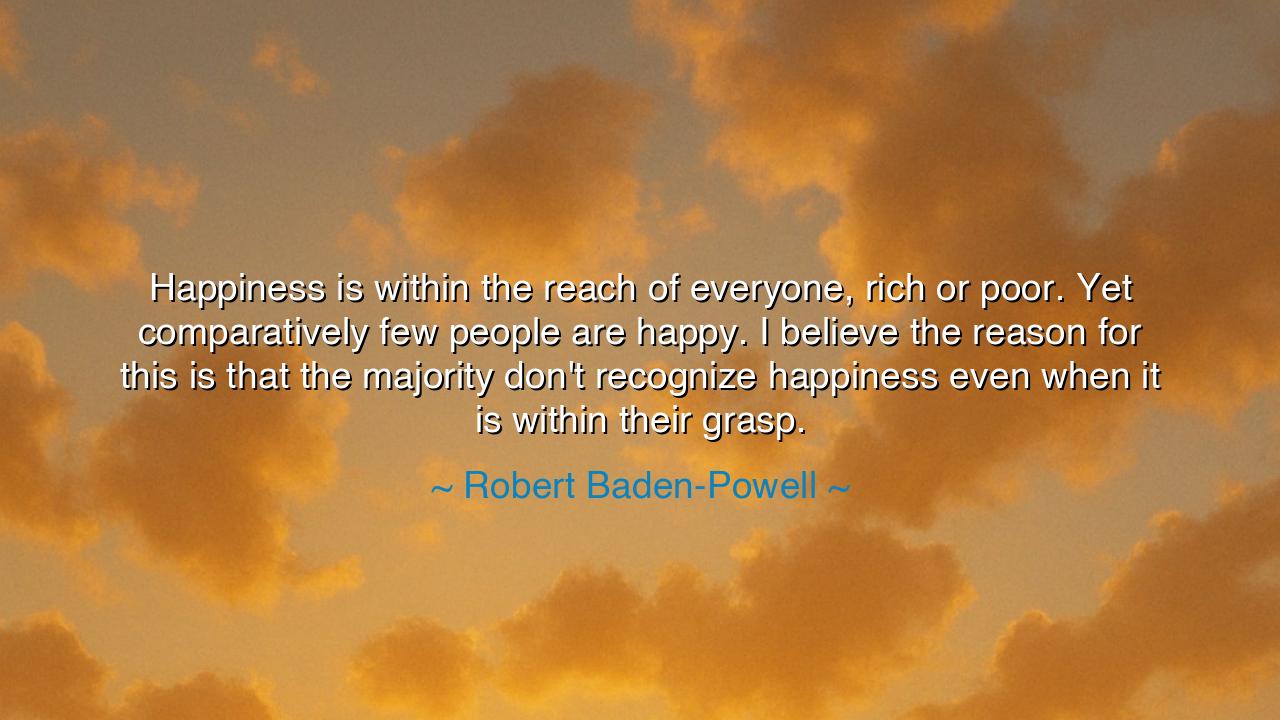
Happiness is within the reach of everyone, rich or poor. Yet
Happiness is within the reach of everyone, rich or poor. Yet comparatively few people are happy. I believe the reason for this is that the majority don't recognize happiness even when it is within their grasp.






The words of Robert Baden-Powell—“Happiness is within the reach of everyone, rich or poor. Yet comparatively few people are happy. I believe the reason for this is that the majority don’t recognize happiness even when it is within their grasp”—shine like a lantern held against the darkness of human discontent. In these lines, the founder of the Scouting Movement, a man who dedicated his life to the formation of noble character and joyful living, reveals one of the simplest yet most profound truths: that happiness is not a treasure hidden in the distance, but a light already burning within the heart. The tragedy, he says, is not that happiness is scarce—but that the eyes of men are blind to its presence.
To the ancients, this truth was no less sacred. The philosophers of old sought happiness not in the clamor of wealth or conquest, but in harmony with the soul. Epicurus taught that joy springs not from abundance, but from simplicity—a loaf of bread, a friend to share it with, and the absence of fear. Socrates, condemned yet serene, found happiness in truth and virtue rather than in comfort or acclaim. These sages, like Baden-Powell, understood that man’s misery often arises not from the world’s cruelty, but from his own failure to see clearly. The heart, clouded by desire and comparison, mistakes the fleeting glitter of pleasure for the steady gold of happiness.
Baden-Powell himself lived through the turbulence of war and the temptations of worldly honor. As a British general and later a global teacher of youth, he saw men of every station—soldiers, nobles, and peasants alike—and found that joy was not distributed by fortune’s hand. He observed that many who possessed much were anxious, and many who had little were content. This reflection gave birth to his teaching: that happiness is not given, but recognized. It is a state of mind born from gratitude, simplicity, and purpose. To the restless soul that forever seeks “more,” happiness will always flee; but to the humble heart that pauses to notice the beauty already in its grasp, joy becomes as natural as breathing.
History offers countless witnesses to this truth. Consider Helen Keller, who, though blind and deaf, once said, “Everything has its wonders, even darkness and silence.” Though deprived of senses most take for granted, she lived a life of purpose and radiant peace. Why? Because she recognized what others overlook: the miracle of being alive, the beauty of connection, the sacred gift of learning and love. Helen Keller was not handed happiness; she discovered it within herself, as Baden-Powell teaches every soul to do.
Yet, how easily man turns away from such simplicity! The modern world, rich in comforts and diversions, has only deepened the blindness that Baden-Powell lamented. Surrounded by abundance, many are still unsatisfied, for they have forgotten to see the small joys that dwell in the everyday. A sunrise is dismissed as ordinary; a shared laugh is forgotten before nightfall. We chase shadows of success while the substance of contentment sits quietly beside us, unrecognized. This blindness, more than any poverty or hardship, is the true thief of happiness.
The wisdom of Baden-Powell calls us back to the discipline of gratitude. He does not say happiness is effortless—only that it is always possible. To recognize happiness is to train






AAdministratorAdministrator
Welcome, honored guests. Please leave a comment, we will respond soon